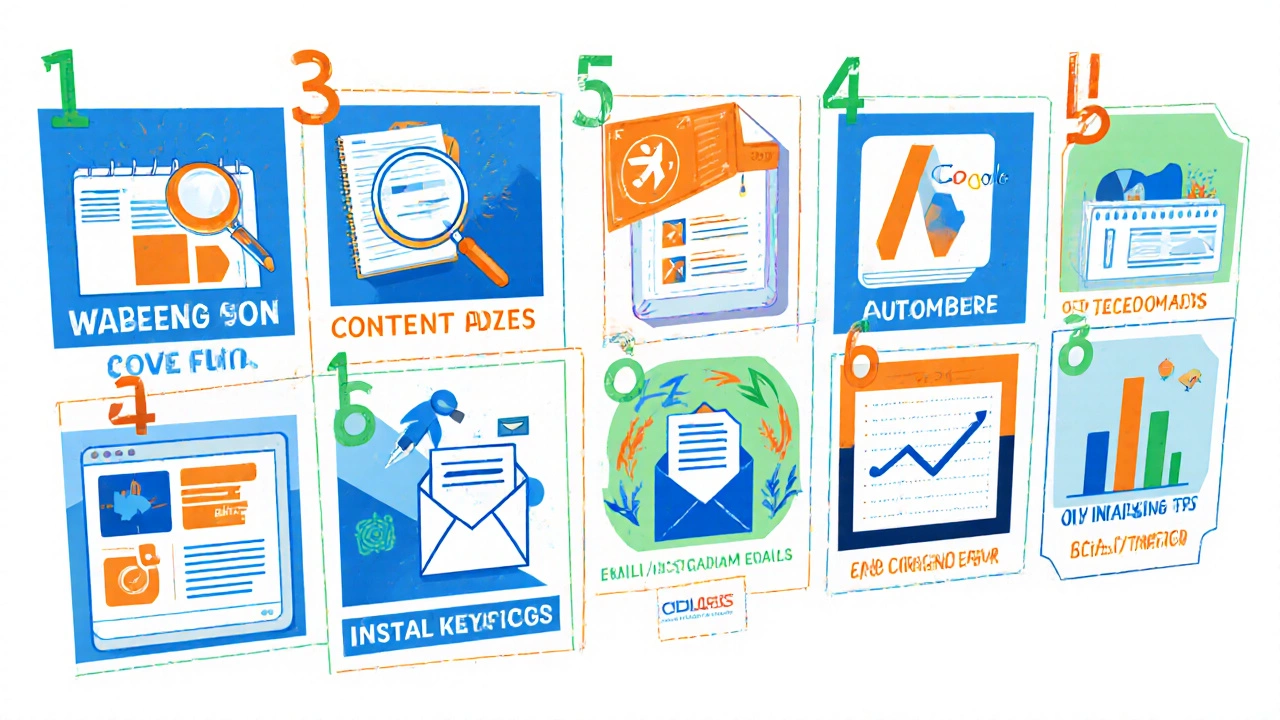3-Month Digital Marketing Learning Planner
Create Your Custom Learning Plan
Complete this form to generate a personalized 12-week digital marketing roadmap based on your current knowledge and goals.
When people ask, digital marketing is the practice of promoting products or services through online channels like search engines, social media, email, and websites. The short answer? Yes, you can land a junior digital marketing role in three months-if you pick the right focus, stick to a disciplined schedule, and build a portfolio that proves you can drive results.
A well‑structured digital marketing course can fast‑track your journey, but it’s the hands‑on practice that makes employers take notice. Below you’ll find a realistic 12‑week roadmap, the core skills you must master, free and paid resources, and a step‑by‑step plan to showcase your work.
TL;DR: What 3‑Month Success Looks Like
- Weeks 1‑4: Foundations - SEO, Content Marketing, and basic analytics.
- Weeks 5‑8: Paid channels - Google Ads, Facebook/Instagram Ads, email automation.
- Weeks 9‑12: Portfolio projects, personal branding, and job‑search tactics.
- Outcome: A ready‑to‑show portfolio and at least one certification (Google Ads or HubSpot).
Week‑by‑Week Roadmap
The key is to treat every week like a mini‑boot camp. Each block ends with a deliverable you can add to your portfolio.
Weeks 1‑2: SEO Basics + Keyword Research
Start with SEO (search engine optimization). Learn how search engines crawl, index, and rank pages. Recommended free resources: Google’s SEO Starter Guide and Moz’s Beginner’s Guide.
- Goal: Conduct keyword research for a mock business using Google Keyword Planner and create a 10‑page SEO brief.
- Deliverable: On‑page SEO audit (title tags, meta descriptions, header hierarchy) for a real blog.
Weeks 3‑4: Content Marketing & Copywriting
Good content fuels SEO and paid ads. Focus on headline formulas, persuasive copy, and content structures (listicles, how‑to guides, case studies). Use the HubSpot Content Marketing Certification (free) to get a badge.
- Goal: Write three blog posts (800‑1,200 words each) optimized for the keywords you researched.
- Deliverable: Publish the posts on a free WordPress.com site and capture traffic data via Google Analytics.
Weeks 5‑6: Google Ads Fundamentals
Paid search is the fastest way to generate leads. Enroll in the Google Ads Search Certification (free) and set up a dummy campaign for the same mock business.
- Goal: Learn keyword match types, ad copy limits, and quality score.
- Deliverable: Screenshot of a live‑search campaign (budget set to $1/day) and a brief performance report.
Weeks 7‑8: Social Media Advertising
Most brands allocate a sizable portion of ad spend to Facebook and Instagram. Use the Facebook Blueprint courses (some free modules) to understand audience targeting, creative specs, and conversion tracking.
- Goal: Create a carousel ad set promoting one of your blog posts.
- Deliverable: Campaign structure diagram and a 150‑word copy rationale.
Weeks 9‑10: Email Marketing & Automation
Automation keeps prospects moving down the funnel. Sign up for a free Mailchimp account, import a list of fictional contacts, and design a welcome series.
- Goal: Write three automated emails (welcome, education, promotion).
- Deliverable: Screenshot of the automation workflow and open‑rate predictions.
Weeks 11‑12: Portfolio & Job Hunt
By now you have four concrete assets: an SEO audit, three blog posts with analytics, a live Google Ads campaign, and a social media ad set. Bundle them into a single PDF or a personal site.
- Build a simple personal website using Carrd or GitHub Pages.
- Update your LinkedIn headline to "Aspiring Digital Marketer - SEO, Paid Media, Content Creator".
- Apply to entry‑level roles (Marketing Assistant, Junior PPC Specialist, Content Coordinator) and reference your portfolio in the cover letter.
Essential Skill Set (Why These Matter)
Employers look for a blend of analytical and creative abilities. Below is a quick cheat‑sheet of the must‑know tools and concepts.
| Skill | Why It Matters | Starter Tool |
|---|---|---|
| SEO | Drives organic traffic, long‑term ROI | Google Keyword Planner, Ahrefs (free trial) |
| Content Creation | Feeds SEO, social, email funnels | Google Docs, Canva |
| PPC (Google Ads) | Instant traffic, measurable ROI | Google Ads UI |
| Social Media Ads | Targeted reach, brand awareness | Meta Business Suite |
| Email Automation | Retention & nurture | Mailchimp |
| Analytics | Data‑driven decisions | Google Analytics |

Free & Paid Learning Resources (Pick One Path)
Below are three curated tracks. Choose the one that matches your budget and learning style.
- Zero‑Cost Track: Google Digital Garage, HubSpot Academy, Facebook Blueprint free modules, Mailchimp Free.
- Mid‑Range Track ($50‑$150): Udemy’s “The Complete Digital Marketing Course” (often on sale), Coursera’s “Digital Marketing Specialization” (audit for free, pay for certificate).
- Premium Track ($300‑$600): Bootcamps like General Assembly or BrainStation, which include mentorship and live projects.
Whichever path you pick, aim to finish at least one recognized certification by week 8. Certifications act as proof points on your resume.
Common Pitfalls & How to Dodge Them
Three months can feel like a sprint, and it’s easy to slip into these traps.
- Too Much Theory: If you spend more than a week reading without creating, you’ll stall. Pair every lesson with a hands‑on task.
- Neglecting Data: Running ads without tracking results teaches the wrong lessons. Always set up UTM parameters and review performance.
- Skipping the Portfolio: Certifications look good, but recruiters want to see real work. Treat each deliverable as a live case study.

Next Steps After the 3‑Month Sprint
When you land that first role, keep learning. Digital marketing evolves quickly-new ad formats, privacy changes, AI‑driven copy tools. Commit to a weekly 2‑hour “skill‑upgrade” slot and update your portfolio quarterly.
Frequently Asked Questions
Can I really learn everything in three months?
You won’t become a master, but you can acquire enough practical skills to qualify for junior roles. Focus on core channels (SEO, paid search, social ads) and build a portfolio that shows real results.
Do I need a degree to get a digital marketing job?
No. Most entry‑level positions value certification, hands‑on projects, and a track record of traffic or conversion improvements more than a formal degree.
Which certification matters most for beginners?
Google Ads Search Certification and HubSpot Content Marketing Certification are widely recognized and free, making them perfect starter badges.
How much time should I study each day?
Aim for 2-3 focused hours on weekdays and a deeper 5‑hour session on weekends. Consistency beats occasional marathon sessions.
What should my portfolio include?
At least one SEO audit with keyword rankings, three content pieces with traffic data, a live Google Ads or Facebook ad screenshot, and an email automation flow. Explain the goal, your approach, and the results.





Write a comment